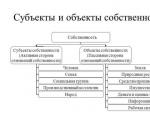Presentation on the topic of ecology in the dow. Presentation "ecological education of children of early preschool age". decorating corners and walls
Description of the presentation on individual slides:
1 slide
Description of the slide:
Consultation for educators "Environmental education in kindergarten" Author: educator O.V. Tretyakova MUNICIPAL BUDGET PRESCHOOL EDUCATIONAL INSTITUTION "KINDERGARTEN №48" BEES "Tambov 2016
2 slide
Description of the slide:
“For a fish - water, for a bird - air, for a beast - forest, steppes, mountains. And a man needs a homeland. And to protect nature means to protect the Motherland”, M.M. Prishvin.
3 slide
Description of the slide:
Nature is not only a temple of health and aesthetic pleasure. Nature is a powerful ancient source of knowledge and education of mankind. We must teach children to love and respect nature, to protect it, but first we ourselves must learn to love it. Relevance
4 slide
Description of the slide:
The goal of ecological education of preschool children is the formation of the principles of ecological culture. The formation of the principles of ecological culture is the formation, awareness of the correct attitude directly to nature itself in all its diversity, to people who preserve and create it, as well as to people who create material or spiritual values on the basis of wealth.
5 slide
Description of the slide:
Preschoolers are the initial link in the system of continuous education, which means that the content of their education should be related to the content of environmental education of the next steps - schoolchildren. Elementary environmental knowledge acquired by children at a young age will help them to master environmental subjects in the future;
6 slide
Description of the slide:
Knowledge is not an end in itself, it only helps to form in children a certain attitude towards nature, environmentally competent and safe behavior, and an active life position; In children preschool age cognitive interest, in particular to nature, is very developed. It is at this age that they perceive the world as a whole, which contributes to the formation of an ecological outlook. It is very important to maintain this cognitive interest;
7 slide
Description of the slide:
The content must be scientific. Despite their age, children should receive in an accessible form scientific ideas about the world around them, in particular, about nature. The formation of a scientific worldview is especially important in our time, when a mythologized consciousness is widespread in society, not scientific approach to the explanation of natural phenomena; The content should contribute to the formation in children of a holistic perception of the world around, on the one hand, and the interrelationships of the parts of this whole, on the other;
8 slide
Description of the slide:
Ecological education - part general education, it has an interdisciplinary character, contributes to the development of thinking, speech, erudition, the emotional sphere, moral education, that is, the formation of the personality as a whole; Norms of environmentally competent safe behavior: children should learn to understand and form independently on the basis of a complex of elementary environmental knowledge and awareness of cause-and-effect relationships in nature;
9 slide
Description of the slide:
The child must realize himself as a part of nature, environmental education contributes to the formation in children of not only a certain attitude towards nature (in particular, the rejection of a purely consumer approach), but also the skills of rational use of nature.
10 slide
Description of the slide:
Methods of ecological education. Teaching methods are ways of joint activity of the educator and children, during which knowledge, skills and abilities are formed, as well as attitudes towards the world around them. In the pedagogical process kindergarten various teaching methods are used: visual, practical, verbal.
11 slide
Description of the slide:
Visual methods include observation, viewing pictures, demonstrating models. Practical methods are games, elementary experiments and simulations. Verbal methods are the stories of the teacher and children, reading works of art about nature, conversations. Children's labor in nature Diverse labor in nature gives children a lot of joy and contributes to their comprehensive development. In the process of labor, love for nature, a careful attitude towards it are brought up.
12 slide
Description of the slide:
The game is a very important method of environmental education Subject games are games using various objects of nature (leaves, seeds, fruits). In subject games, children's ideas about the properties and qualities of certain objects of nature are clarified, concretized and enriched. Board-printed games are games such as loto, dominoes, split and paired pictures. Preschoolers enjoy playing Zoological Lotto, Botanical Lotto, Who Lives Where? etc.
13 slide
Description of the slide:
Word games are games, the content of which is a variety of knowledge that children have, and the word itself. They are held to consolidate children's knowledge about the properties and characteristics of certain objects. Word games develop attention, intelligence, speed of reaction, coherent speech. Outdoor games of a natural history nature are associated with the imitation of the habits of animals, their way of life. By imitating actions, imitating sounds, children consolidate knowledge; the joy received during the game contributes to the deepening of interest in nature.
14 slide
Description of the slide:
Among the various methods of environmental education of preschoolers, an important place should be given to observation. Its essence lies in the sensory knowledge of natural objects, in their knowledge through various forms perception - visual, auditory, tactile, gustatory, olfactory. Great opportunities for observation are provided by the seasonal life of plants. The different state of trees and shrubs, the appearance and disappearance of herbaceous vegetation in the warm and cold seasons allow children in the process of observation to form ideas about the dependence of plant life on external conditions.
15 slide
Description of the slide:
Promotions are socially significant events that are held in preschool its employees and children, the participation of parents is desirable. Actions, as a rule, are timed to coincide with some dates, events of public importance. Another form of environmental work in kindergarten is environmental holidays and leisure activities. Ecological holidays can be dedicated to the seasons, harvest, birds, etc.
16 slide
Description of the slide:
With preschool children, you can conduct simple experiments with various objects of animate and inanimate nature. Specially organized experimental situations, in contrast to simple observations, make it possible to more clearly see individual properties, aspects, features of plants, animals, and their vital activity. Experiments encourage children to compare, compare, develop observation, perception, thinking. Interesting experiments can be carried out with water, air, sand and clay, when growing greens, such as onions. The modeling method occupies a significant place in the system of environmental education. Work with the calendar of nature, diagrams, tables, etc.
17 slide
Description of the slide:
Model "Ecological education of preschoolers" Familiarization of children with nature Organization and holding of exhibitions, reviews, competitions Labor activity in nature Creation of conditions for work on environmental education, equipping nature corners in groups, equipping with items for plant care Observation of living objects and seasonal natural phenomena - targeted walks - excursions - work with nature calendars, sketches Creation of a fund of methodical and visual - illustrative material , an exhibition of books on natural history, design of material on environmental education for parents educational process, ecological leisure, musical holidays, quizzes on ecological topics, construction from natural materials Ecological education of preschoolers
18 slide
Description of the slide:
Layout "Joint activities of the educator and children" Diagnosis of environmental education of children Role-playing and d / games Targeted walks in nature Observation in the corner of nature Working with models Visual activities on environmental topics Watching films about nature Experimental, experimental, search activities Creating self-made books Reading children's fiction Ecological leisure and holidays Examination of didactic pictures, illustrations about nature Work in the mini-center of nature and on the site Conversations with children on environmental topics Working with nature calendars, observation diaries Collecting collections of seeds, stones, designing a herbarium Joint activities of a teacher and children
19 slide
Description of the slide:
Model "Environmental education of parents" Cognitive Environment and health of the child The state of the environment in their own microdistrict, city Ways to solve these problems Development of the child through acquaintance with the outside world Methods for familiarizing the child with the outside world Activity Participation in environmental campaigns together with children Participation in environmental holidays, excursions, hikes Growing plants Reading literature together with children Normative Knowledge of the rules of behavior during outdoor recreation, environmental safety rules and norms of behavior in experimental situations Choosing environmentally safe areas for walking with children, playing sports, gardening Environmental Safety dwellings, environmentally friendly products Knowledge of the psychological characteristics of the child and the opportunities and needs corresponding to his age, including those in communication with nature
20 slide
Description of the slide:
Ecological education of preschool children is an important component of the process of harmonious development. Do not forget about this and pay as much attention as possible to solving the tasks set, acting in a coordinated manner. The most important thing for which ecological education is needed for a child of this age is the timely formation of a positive personal opinion and love for the wildlife around him. Also, such education helps children to get basic knowledge about phenomena that occur in animate and inanimate nature.
Tatyana Odintsova
Presentation "Environmental education of preschoolers"
Municipal budgetary preschool educational institution
"Kindergarten No. 9 in Lgov"
PRESENTATION
"Ecological education of preschoolers"
Prepared by the teacher:
Odintsova Tatyana Ivanovna
slide 1
MBDOU "Kindergarten No. 9 of Lgov"
"Environmental education of preschoolers"
Prepared by: Odintsova Tatyana Ivanovna
slide 2
“To protect nature means to protect the Motherland!”
Wise nature teaches us at any time of the year
Birds teach singing, spiders teach patience.
The bees in the field and garden teach us to work.
And besides, everything in their work is fair.
Reflection in the water teaches us truthfulness,
The snow teaches us purity, the sun teaches kindness,
And with all the immensity teaches modesty.
Nature all year round you can learn
Us trees of all kinds
All the big forest people,
They teach strong friendship.
slide 3
So what is ecology?
Ecology is a biological science that studies the relationship of organisms with their environment and with each other.
Ecological education of preschoolers- this is an acquaintance of children with nature, which is based on an ecological approach, and the pedagogical process is based on the fundamental ideas of the concept of ecology.
slide 4
In this way, goal of environmental education- this is
the formation of a new type of person with a new ecological thinking, capable of realizing the consequences of their actions in relation to the environment and able to live in relative harmony with nature.
Tasks:
Form a system of environmental knowledge and ideas (intellectual development);
Develop aesthetic feelings (the ability to see and feel the beauty of nature, admire it, the desire to preserve it).
The participation of children in activities that are feasible for them to care for plants and animals, to protect and protect nature.
slide 5
At present, new trends and problems are being observed in the field of ecology, indicating the need for environmental education to reach a qualitatively new level.
slide 6
My theme of self-education "Environmental education of preschoolers and I do a lot of work on environmental education.
Firstly, these are, of course, environmental classes, in which we get acquainted with vegetables and fruits, berries and mushrooms, medicinal plants. Find out where they grow, how to collect them correctly. We get acquainted with animals, insects, birds, trees, with the conditions of their growth, habitat. The acquired knowledge is consolidated in practice and in artistic creativity.
Slide 7
I conduct not only classes on environmental education, but also conducted projects with children throughout the year. For example, "Mr. Bow".
Target: expand the knowledge of children and parents about the types and properties of onions
We prepared a corner of nature, planted onions. For two weeks, the children watched the growth of green feathers with pleasure, we also kept a calendar of observations in the group and in the conditions of the pupils' home. We took the sprouted onions to the cooks in the kitchen of the kindergarten. This project is significant for all its participants. Children gained new knowledge, the teacher continued to master the design method, parents expanded the possibilities of cooperation with their children.
Slide 8
Project "Birds".
Target: to cultivate a caring attitude towards birds, to teach them to express their concern for them in useful activities
During the project, we met different types birds, both migratory and wintering. We learned their features, habits, habitats, what they eat. We read a lot about birds, guessed riddles, learned poems, drew and colored birds, collected split pictures, did appliqué and origami, held exhibitions creative works. All information received about birds was periodically updated in a corner of nature. It was a very rich and educational project.
Slide 9
I work very closely with my family on environmental education. Only by relying on the family, only by joint efforts can we solve the main task - educating a person with a capital letter, an environmentally literate person. In working with parents on the environmental education of children, I use traditional forms ( parent meetings, consultations, conversations). In December, an environmental campaign was held under the Birds project "Feed the Birds in Winter"
Promotion plan:
1. Lesson "Bird dining"
2. Making bird feeders by parents together with their children.
3. Hanging feeders around the kindergarten. 4. Daily feeding of birds.
5. Observations of birds and their habits.
Slide 10
In my work I often use didactic games on ecology, such as “Which branch are the children from?”, “Who lives where?”, split pictures, etc. In the game, children develop intellectually, learn to perceive the world more sensually, consolidate knowledge.
slide 11
A corner of nature has been created in the group, which introduces children to indoor plants, the conditions necessary for their growth and development, for observation and work in nature.
slide 12
Walking is also widely used for environmental education of children. I introduce children to the changes in nature through the seasons. On walks I organize games with natural material(sand, water, snow, leaves, fruits). For such games on the site we have equipment such as a box of sand, scoops, molds, seals. It is on a walk that children get acquainted with the properties of sand, earth, snow, ice, water. Children love to draw in the sand. In addition, a variety of game exercises are used: “Find by description”, “What grows where”, “Find out and name”, “Top-roots”.
slide 13
I believe that in the work I have done there are positive results:
The beginnings of ecological culture in children have been formed;
A consciously correct attitude to objects and natural phenomena, ecological thinking has been formed;
Children learn practical actions to protect nature;
Children have a desire to communicate with nature and reflect their impressions through different kinds activities.
Slide 14
Everything good in people comes from childhood!
How to awaken the origins of goodness?
Touch nature with all your heart:
Surprise, learn, love!
I want the earth to flourish
And grew like flowers, kids,
So that for them the ecology becomes -
Not science, but part of the soul!
slide 15
Thank you for your attention!
Work completed
teacher Karaeva Marina Viktorovna

Ecological education of preschool children.
The continuous process of upbringing and development of the child, aimed at the formation of his ecological culture, which manifests itself in an emotionally positive attitude towards nature, the world around him, in a responsible attitude towards his health and the state of the environment, in the observance of certain moral standards, in the system of value orientations.

Just as a caring gardener strengthens the root of a small tree that has barely risen above the ground, the power that the life of the plant depends on for several decades, so the educator should take care of educating his children's feelings of boundless love for the Motherland. The education of these qualities begins from the time when the child begins to see, learn, evaluate the world around him.
V.A. Sukhomlinsky

Relevance of the problem
Ecological upbringing and education of children is extremely actual problem present tense. Aggravation environmental problem in the country and in the world dictates the need for intensive educational work on the formation of ecological consciousness, nature management culture.

Target:
education of an environmentally literate, socially active preschooler, responsible for the state of the environment, caring for the riches of nature.

Tasks: 1. Improve the subject-developing environment of the cognitive-research direction; 2. Contribute to the formation in children of a conscious understanding of the relationships in nature and taking this into account in practical activities; 3. To enrich the speech of children through a systematic and consistent acquaintance with the outside world; 4. Develop the ability to draw conclusions; 5. To educate, together with parents, in children an emotionally positive, careful and sympathetic attitude towards objects of the natural environment.

Basic principles of my work
Focus on
child's age
Consistency
Integration
Continuity
interactions
with baby
in preschool
institutions and families

Forms of work
:
Excursions
on nature
didactic,
movable,
story-role
Watching
vegetable
and the animal world
for the work of adults
Labor
activity
in the corner of nature
cognitive
With kids
preschool
age
Musical and
sports
entertainment
reading literature,
learning poetry,
proverbs, sayings
activity

The first thing I
did it started
create
developing environment
ecological
directions where
pupils
on one's own
get to know
the world,
watching over
objects and
living phenomena and
inanimate nature

I turn on the gaming
learning situations. I
I suggest to children
plot, take over
main role and
I distribute the rest
between children. Plan,
according to which
the plot develops
corresponds to the logic
solutions for didactic
tasks

Great importance in environmental education has environment in the kindergarten area. In the process of working with children, I noticed that they easily entered specific observations.
learn the connections between different natural
phenomena.


Forms of work
parents
Environmental
Questionnaire,
conducting
photo reports,
homemade
Parental
meetings,
consultations
Informational
ecological
Family
living rooms

Together with parents and
we started as children
decorating corners and walls
our group

Forms of work
Practical
seminars
Ecological
Advanced
Pedagogical
teachers
Thematic
Video trainings
Creative

Pupils should know
Pupils must be able to
- fundamentals of ecological culture
- some features of the nature of their region
- main features of the seasons
- the meaning of nature for man
- groups of plants and animals
- some plants and animals of their region, country
- rules of conduct in nature
- distinguish between objects of nature and objects that are not related to nature
- follow the rules of personal hygiene
- distinguish between studied plants and animals
- conduct observations in nature under the guidance of an educator
- feed the birds in the feeders
- take care of indoor plants

Results of work:
- my children learned the signs of seasonal changes in nature;
- many know about seasonal work in the garden, in the garden, about plants, mushrooms, berries;
- can classify animals according to their habitat (water - geese, swans, fish, frogs);
- can classify the inhabitants of nature according to their characteristics - wild animals, domestic animals;
- migratory and wintering birds;
- insects;
- fish;
- know that for the normal growth and development of plants, three components are needed: heat, light, water; made sure of this in experiments;
- are able to distinguish trees;
- children are familiar with the rules of behavior in nature;
- have basic plant care skills.

Everything good in children from childhood!
How to awaken the origins of goodness?
Touch nature with all your heart:
Surprise, learn, love!
We want the earth to flourish.
They grew like flowers, kids
So that for them the ecology becomes




